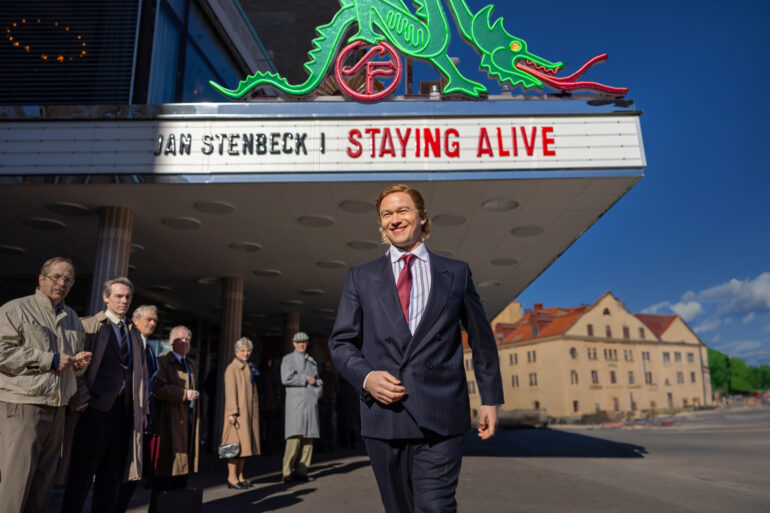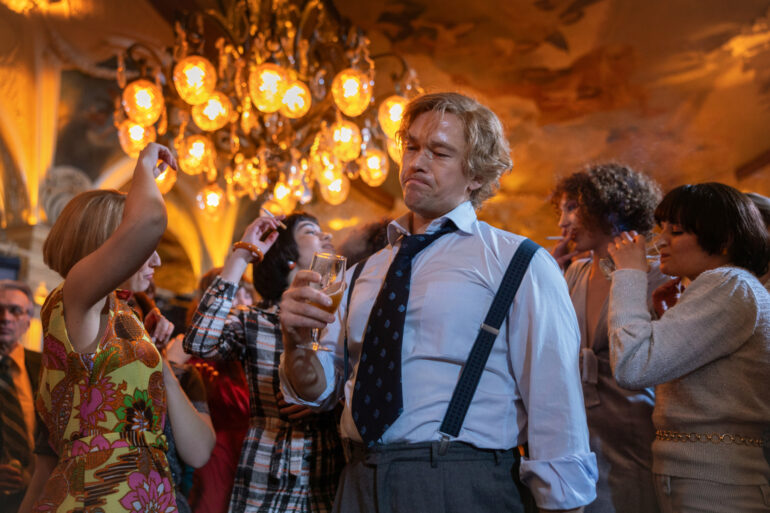Written by: Davide Abbatescianni
19.06.25
At this year’s Monte-Carlo Television Festival, NFTVF spoke to the creative team behind the FLX drama, aired across the Nordics and already sold to a raft of countries worldwide.
Viaplay’s five-part series Vanguard (Stenbeck), a sweeping biographical drama charting the life and legacy of trailblazing entrepreneur Jan Stenbeck, has emerged as the standout winner of the 64th Monte-Carlo Television Festival (13–17 June), taking home the coveted Golden Nymph Award for Best Series. The FLX-produced show, headlined by Jakob Oftebro and helmed by Goran Kapetanović, marks a significant achievement for the Nordic region on the global television stage.
Premiering to enthusiastic acclaim, Vanguard paints an intricate portrait of a Swedish media mogul who challenged conventions and reshaped Scandinavia’s business and communication landscape. The story, spanning four decades from the late 1970s to the early 2000s, follows Stenbeck as he transforms a conservative family-owned industrial empire into a modern, multi-platform media powerhouse.
Reflecting on why this story felt timely, director Kapetanović told Nordisk Film & TV Fond that what drew him in was Stenbeck’s unapologetic desire to disrupt the status quo. “He was like a prince who came back to the old kingdom, only to paint the castle pink,” Kapetanović said, describing the tycoon’s drive to reinvent traditional industry with an entrepreneurial vision imported from the United States. “He wanted to give power to the people — through mobile phones, through television, through independent media.”
But depicting the rise of such an influential yet controversial figure over four tumultuous decades wasn’t without its challenges. Kapetanović and his team made a deliberate decision to base the production in Sweden, working closely with Film i Väst in Gothenburg. “We wanted to keep everything anchored here — even if some scenes were set in New York or London,” he said. Recreating the passage of time meant extensive work on costumes, sets, vehicles, and character behaviour. “People change in 40 years — not just how they dress, but how they speak, how they move. We added subtle cues everywhere, from posture to tone, to reflect that evolution.”
Central to Vanguard’s success is Oftebro’s striking performance as Stenbeck, a role that required not just charisma, but considerable physical transformation. Kapetanović, known for launching new talents in Sweden, had already recognised Oftebro’s rare versatility, but what sealed the deal was the actor’s linguistic dexterity — he speaks Swedish, Norwegian, and Danish fluently. “Jakob was the right age, had personal experiences to draw from, and most importantly, he wanted it. He was ready to wear a fat suit, endure prosthetics, and carry the emotional weight of a complex man,” the director explained. “We worked with the same makeup team behind Stellan Skarsgård’s look in Dune. The transformation was immense.”
While Oftebro anchored the series, the ensemble cast was encouraged to strike a balance between historical authenticity and dramatic interpretation. Kapetanović spent over two years gathering material — videos, photographs, interviews — offering it as a foundation. “I told them: Here is the base. Now build something unique on top of it,” he said.
Visually, the series draws inspiration from iconic works like The Godfather and First Man. Cinematographer Marek Wieser and Kapetanović worked closely to develop a shooting style that favoured wider frames and long takes, eschewing excessive close-ups to preserve a lived-in authenticity. “We wanted to open up the world — let the audience feel the environments, the shifts in time, the texture of each era. And the colours played a big part in creating those emotional atmospheres.”
For lead writer Alex Haridi, structuring Vanguard was about creating “a focused tapestry of moments”. Drawing inspiration from Netflix hit The Crown, each of the show’s five episodes covers a distinct year in Jan Stenbeck’s life — 1977, 1981, 1983, 1987, and 1991 — zooming in on limited timeframes rather than attempting a linear cradle-to-grave arc. Based on Per Andersson’s biography “Stenbeck: A Biography of a Successful Businessman”, the script draws from extensive research and conversations with former colleagues and business partners, though the Stenbeck family declined involvement. Haridi was struck by Stenbeck’s polarising legacy: “He’s either a saviour who broke the dull 1970s, or the devil who dismantled Swedish industrialism.” The rivalry with his sister, long presumed to be the heir, became a powerful emotional undercurrent. “It’s almost like two kids in a playground fighting over who gets the spade — and that shaped the society we live in,” Haridi reflected.
Executive producer Erik Hultkvist highlighted the production’s commitment to authenticity —despite budget and location constraints. One of the biggest challenges was recreating Stenbeck’s Long Island home without leaving Sweden. “It took ages,” said Hultkvist, “but we eventually found the perfect match — in Skåne.”
Vanguard was developed under the N8 Alliance and supported by Nordisk Film & TV Fond — an ambitious project involving multiple stakeholders across the region. Asked whether this posed challenges, Kapetanović was unequivocal: “Honestly, it worked beautifully. Everyone — from the producers to the writers and funders — shared the same vision. We welcomed feedback, but we were all pulling in the same direction. That made all the difference.”
The show already aired in Sweden, Norway, Iceland, and Finland, with Denmark following suit at the end of June. Viaplay recently sold it to Ireland, Estonia, the US, UK, Poland, Greece, Latin America, Germany, the Netherlands, Belgium, and the Czech Republic.
Official trailer:
Beyond the awards, Vanguard’s win signals the strength and originality of Nordic storytelling on the international stage. Alongside the series, one more Swedish production shone at Monte-Carlo: the documentary The Lundin Case – Silence Every Witness (Lundinfallet - Tysta alla vittnen), which was screened in the News and Documentary sidebar. Meanwhile, docmaker Tonje Hessen Schei (Praying for Armageddon) and Leif Holst Jensen, of Norway’s INN University, took part in the event’s Business Content programme, underscoring the region’s cross-sector engagement and offering their insights on non-fiction filmmaking and AI production, respectively.
Held annually in the glamorous setting of the Principality, Monte-Carlo brings together international broadcasters, streamers, producers, and on-screen talent for five days of networking, panels, gala events, and high-profile screenings. Traditionally strong in fiction and current-affairs programming, the event has become an increasingly strategic platform for tracking industry shifts.
Nordic professionals benefit from a more intimate setting during the Business Content Days, where afternoon talks are followed by networking events and dinners. The festival also serves as a hub for players from beyond Europe, particularly the Americas and Asia.
While many topics followed familiar lines, geopolitical uncertainty shaped once again nearly every discussion — from the impact of AI to the global crisis of public service broadcasting, shrinking budgets, and the surging appetite for real-life stories. Staying in tune with the zeitgeist, both in drama and documentary, emerged as the central concern across panels and informal conversations alike.

